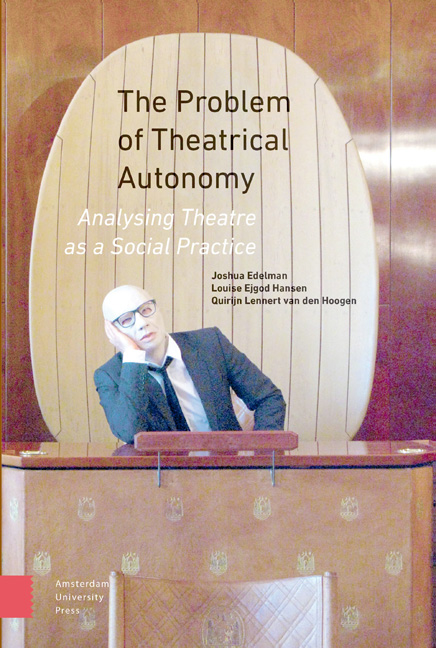Book contents
- Frontmatter
- Acknowledgements
- Contents
- List of Figures and Tables
- Introduction
- 1 How Can we Define Autonomy?
- 2 The Concept of Artistic Autonomy
- 3 Autonomy in the Contemporary Theatre
- 4 How Agents in Theatre Fields Make use of Claims to Autonomy
- 5 How Theatre Organization Shapes Claims to Autonomy
- 6 How Claims to Autonomy Serve those Outside Theatre Fields
- Conclusion
- References
- About the Authors
- Index
Conclusion
Published online by Cambridge University Press: 12 February 2021
- Frontmatter
- Acknowledgements
- Contents
- List of Figures and Tables
- Introduction
- 1 How Can we Define Autonomy?
- 2 The Concept of Artistic Autonomy
- 3 Autonomy in the Contemporary Theatre
- 4 How Agents in Theatre Fields Make use of Claims to Autonomy
- 5 How Theatre Organization Shapes Claims to Autonomy
- 6 How Claims to Autonomy Serve those Outside Theatre Fields
- Conclusion
- References
- About the Authors
- Index
Summary
Over the course of this book, we have developed our initial claim that the concept of autonomy and the debates that surround it are key tools for studying the social structures and dynamics of theatre systems in different countries. Because theatre is so wholly a place- and time-based art form, the comparative study of its social function might require researchers to be present at very different types of events across nations and at the same moments in time, while also grasping a basic knowledge of the social significance of theatre to each society, of theatrical languages and of local ways of connecting to theatre. Such a task is, of course, so massive as to be impossible. This is why comparisons between theatre fields are often largely restricted either to comparing quantitative data on production, dissemination and reception of theatre (see e.g. Van Maanen and Wilmer 1998) or to (case study) comparisons of theatrical aesthetics by describing certain performances, performance practices or specific use of internationally acclaimed playwrights or directors (see, amongst many others, Shevtsova 2004). While such comparisons are often insightful, in our opinion they are necessary of limited use to research on theatre as a social practice. Beyond the figures and aesthetics, there are social relationships between those in and outside theatre fields. Paying attention to the debates surrounding theatrical autonomy is helpful in discerning these relationships, describing how they come about and understanding how they both allow for and restrict theatre's position in society. In this book, we have tried to demonstrate how analysing actions of agents in theatre fields as claims to autonomy can help us understand theatre as a social practice.
The problem of theatrical autonomy adds a structural feature to the study of theatre. By proposing our formula for autonomy—that a theatre field is autonomous to the extent that it pursues its own values—we have offered something like a piece of grammar to describe and analyse the social embeddedness of theatre. Pursuing one's own value implies the notion of specific (theatrical) value, which we have derived from Bourdieu's field theory. We have not set ourselves the task of describing or defining this value specific to the theatre field. This is for three reasons.
- Type
- Chapter
- Information
- The Problem of Theatrical AutonomyAnalysing Theatre as a Social Practice, pp. 199 - 204Publisher: Amsterdam University PressPrint publication year: 2016



